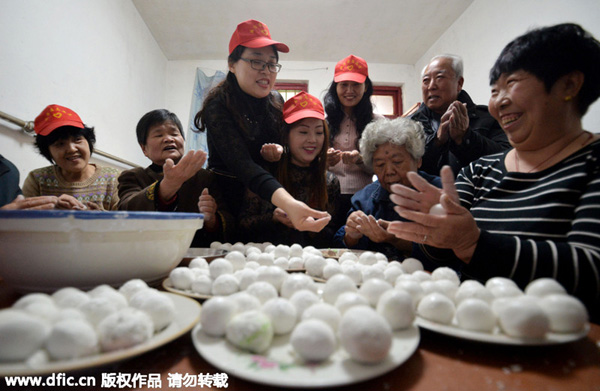Nursing homes, more Chinese old people's final choices
Updated: 2015-10-08 13:26
(Xinhua)
|
|||||||||||
 |
|
Volunteers and empty-nest seniors make Yuan Xiao, a typical food for Lantern Festival, in Handan, Hebei province, March 3, 2015. [Photo/IC] |
BEIJING - Qian Liqun, former professor of the Department of Chinese Language and Literature of Peking University, chose to spend his remaining years with his wife in the nursing home after retirement.
As his colleague in Peking University Wen Rumin wrote in his personal Weibo account, Qian would continue his literature research and writing.
Though some people questioned the intelligence of the decision by Qian, a famous intellectual, an increasing number of China's senior citizens now choose to living in nursing homes rather than spending their remaining years with their offspring at home.
Fortunately for them, modern telecommunications technologies, particularly social networking has made them feel not so far away from their children.
Gao Lanzhi, 75, lives her life in full without the feeling of loneliness and fear, although her daughters live abroad.
One year ago, she moved to the Happiness Senior Citizens Care Center, a private nursing home in west Beijing. Her single room was filled with books and daily necessities. Chinese calligraphy, singing, photography, baking... Gao has many things to do. As she said, "here is my home."
She received a knee surgery last year. But after that, she did not hire any nursing worker at home. "I cannot bear facing just one person all day long,"she said. Thus she moved to the care center, where she found the company of 200 others.
She used to worry the impatience and unprofessionalness of the stuffs at the nursing home. Bus she believes that the hobbies and friends are extremely important for old people, especially in their countable lifetime left.
"The nursing home provides me a quiet and reliable place to do what we like and to meet more peers," Gao said.
Gao's optimism and engaged life are not commonly seen among Chinese old people.
"Most of them usually felt panic and lonely when they firstly taken here by sons or daughters," said Hu Tongwei, director of the Happiness Senior Citizens Care Center. Some of them could adjust to the new environment, others could not.
Wang Jianjun, standing deputy director of the national working committee on aging, acknowledged that China's population would enter a stage of accelerated aging.
By the end of 2014, the number of the Chinese old people above 60 years old was 212 million, about 15.5 percent of the country's total population. The number is expected to reach 480 million by the end of 2050.
More and more old people would have to live alone, without the companionship of their children.
"In this condition, the nursing home would be much more needed, compared with previous years," Hu Tongwei said.
Tweeting sunset
Two latest smart phones and an iPad were put on Gao's desk. She enjoys capturing the unforgettable moments and sharing them with her children via WeChat.
As a matter of fact, the electronic products spread around the seniors in China. And many of them can operate applications on smart phones masterly.
Nowadays some Chinese tech companies have taken on the projects of implementing the connection and interaction between the elderly and their relatives, communities, and hospitals, based on the big data on the Internet. They are integrating resources from all fields to build up a comprehensive platform to serve the aged people.
The data from daily life, including health index, could be collected and uploaded through wearable devices to the cloud platform. And the family members, living afar, receive the date simultaneously. Meanwhile, the hospitals collect the relevant data as well and offer the timely medical service.
In 2013, the State Council issued several suggestions on accelerating aged care service industry and asked the local governments to support enterprises in applying Internet and other new technologies to the industry.
"The high-tech applications would ease the burden the children," Gao said.
Unbalanced distribution of resource
The Happiness Senior Citizens Care Center provides 300 single and double rooms, with the monthly price from 3,800 to 6,000 yuan, as well as different kinds of nursing levels. The center has been almost full now.
The other state-run or private nursing homes in China's big cities also see the similar occupancy rate. "Some old people even have to wait for several months in order to live in the reputable state-run nursing homes in Beijing," Gao Lanzhi said.
However, a newly released report on China's nursing homes showed that the vacancy rate was 48 percent.
This is mainly due to the low occupancy rate of the nursing homes in rural areas, said Wu Yushao, the director of China Research Center on Aging.
With young people from the rural areas moving to the big cities for working, some of their parents were also taken by them outside. Hu Tongwei said, "They hope to give the parents better nursing service in big cities."
China now has more than 5.50 million nursing beds for old people. Around 26 beds are served per thousand old people for average. The Ministry of Civil Affairs promised to accelerate the development of the old-age care services nationwide and increase the number of nursing bed per thousand old people to 30 by the end of this year.
Wu Yushao suggested that there should be a screening system to ensure that those most in need are admitted to nursing homes.
"Without the evaluation of the physical and economic conditions, some healthy and rich old people at lower age occupy the nursing resources," Wu said. "Those without self-care ability and in financial difficulty are kept outside."
Professionals shortage
The aged care service industry in China also faces the awkward situation of lacking professionals.
Before living in the Happiness Senior Citizens Care Center, Gao Lanzhi visited and evaluated several other nursing homes including state-run and private ones.
When she found some nursing staffs lost patience in dealing with the daily affairs of the old people, Gao hesitated about going to the nursing homes.
"Old people care need professional nursing staffs most, rather than expensive facilities" Gao said.
"They should listen to our complaints, offer timely medical service, and know how to make our diet balanced," Gao suggested.
There are 24 nursing staffs at the Happiness Senior Citizens Care Center, ranging from 30 to 50 years old.
"Most of them are middle-aged women having relevant working experience," Hu Tongwei said, "but without professional aged care training."
It is quite common for the nursing homes around China.
China's Ministry of Civil Affairs has set up the national professional standard for the aged care staffs. There are over one million people engaged in nursing service industry for old people all over the country. But only less than 40,000 of them meet the standard.
With the booming aged care service industry, Gao who worked for the continuing education before retirement suggested it's high time for governments to strengthen the training of nursing home workers.
Related Stories
Beijing has no plans to build new large nursing homes 2015-08-24 09:13
Social capital to go to nursing homes 2015-08-20 07:42
Government attention needed for better nursing homes for the aged 2015-07-15 08:00
China to get more premium nursing homes 2015-06-26 14:03
Today's Top News
Merkel, Hollande appeal to MEPs for EU unity
China adopts IMF statistical benchmark, improves transparency
FIFA chief faces 90-day suspension
Fujian governor investigated
China's population to peak in 2025
Beijing says it welcomes TPP deal
Holidayers face hurdles in the homestretch
Snowden: I'd go to prison to return to US
Hot Topics
Lunar probe , China growth forecasts, Emission rules get tougher, China seen through 'colored lens', International board,
Editor's Picks

|

|

|

|

|

|






